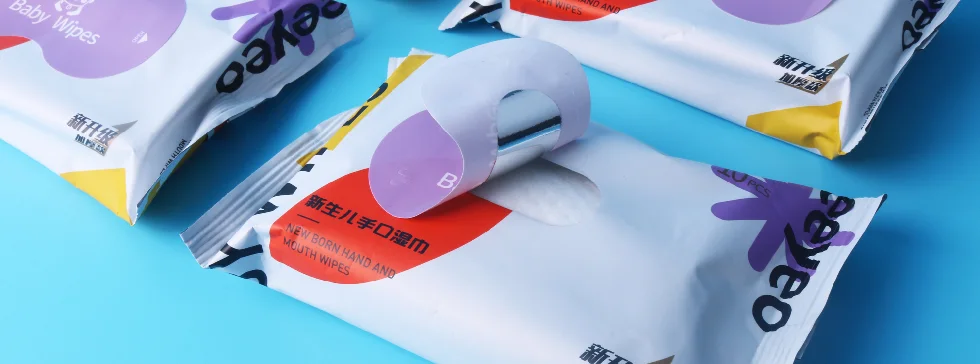Quality control plays a critical role in the operation of reusable plastic baby wet wipes packing bags for several reasons:
- Product Integrity: Quality control ensures that the packing bags meet the required standards for durability, strength, and integrity. This is essential to prevent leaks, tears, or other issues that could compromise the functionality of the bags and the safety of the wet wipes inside.
- Material Selection: Quality control involves rigorous inspection of raw materials used in the production of the packing bags. This ensures that only high-quality plastics are used, free from defects or impurities that could affect the performance or safety of the bags.
- Dimensional Accuracy: Quality control verifies that the packing bags are manufactured to precise dimensions, ensuring compatibility with automated packing machinery and providing a snug fit for the wet wipes. Proper sizing also enhances the overall appearance and usability of the bags.
- Seal Integrity: Quality control checks the sealing process to ensure that the bags are securely sealed, preventing moisture ingress and maintaining the freshness of the wet wipes. Proper seal integrity is crucial for extending the shelf life of the wipes and preserving their quality.
- Print Quality: If the packing bags feature printed designs, logos, or information, quality control ensures that the printing is clear, legible, Wrapping packaging film for baby wipes packaging bag and accurately aligned. This enhances the aesthetic appeal of the bags and contributes to brand visibility and recognition.
- Functional Testing: Quality control may involve functional testing of the packing bags, such as opening and closing mechanisms for resealable bags or zipper functionality for zip-lock bags. This ensures that the bags perform as intended and provide convenient storage and access to the wet wipes.
- Compliance with Regulations: Quality control ensures that the packing bags comply with relevant regulatory standards and requirements for safety, hygiene, and environmental sustainability. Adherence to regulations helps protect consumers and ensures responsible manufacturing practices.
- Customer Satisfaction: Ultimately, quality control plays a vital role in meeting customer expectations and ensuring satisfaction with the packing bags. By consistently delivering high-quality products, manufacturers can build trust and loyalty among consumers, leading to repeat business and positive brand reputation.
Overall, quality control is indispensable in the operation of reusable plastic baby wet wipes packing bags, safeguarding product quality, safety, and consumer satisfaction throughout the manufacturing process.
What measures are in place to prevent contamination of the Reusable Plastic Baby Wet Wipes Packing Bags during production?
Preventing contamination of reusable plastic baby wet wipes packing bags during production is essential to maintain product quality and ensure consumer safety. Several measures can be implemented to minimize the risk of contamination:
- Clean Production Environment: The production facility should be kept clean and well-maintained to minimize the introduction of contaminants. Regular cleaning schedules, including sanitization of equipment and surfaces, help reduce the presence of dust, dirt, and microbial contaminants.
- Strict Hygiene Practices: Operators involved in the production process should adhere to strict hygiene practices, including wearing clean uniforms, washing hands regularly, and using gloves when handling packing bags. This helps prevent the transfer of contaminants from personnel to the bags.
- Segregation of Raw Materials: Raw materials used in the production of packing bags should be stored and handled in designated areas to prevent cross-contamination. Proper labeling and segregation help ensure that materials are used as intended and are not inadvertently mixed with contaminants.
- Quality Control Checks: Regular quality control checks should be conducted throughout the production process to identify any signs of contamination or defects in the packing bags. Visual inspections, as well as testing for microbial contamination or chemical residues, can help detect issues early and prevent contaminated products from reaching consumers.
- Air Filtration Systems: Air filtration systems installed in the production facility help remove airborne contaminants, such as dust, pollen, Reusable Plastic Baby Wet Wipes Packing Bags and microbial particles, from the environment. High-efficiency particulate air (HEPA) filters and air purification systems help maintain clean air quality in the production area.
- Packaging Integrity: The packaging materials used for the packing bags should be inspected for integrity to ensure that they are free from defects or damage that could compromise product safety. Seals, closures, and barriers should be robust and tamper-evident to prevent contamination during storage and transportation.
- Pest Control Measures: Effective pest control measures, such as pest-proofing of the facility, use of traps and baits, and regular inspections, help prevent infestations that could lead to contamination of packing bags. Proper waste management and sanitation practices also deter pests from entering the production area.
- Employee Training: Comprehensive training programs should be provided to employees to educate them about the importance of contamination prevention and proper hygiene practices. Training should cover topics such as personal hygiene, sanitation procedures, and contamination control measures specific to the production process.
By implementing these measures, manufacturers can minimize the risk of contamination of reusable plastic baby wet wipes packing bags during production, ensuring that the final products meet high quality and safety standards.
